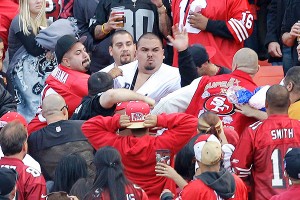By: Nihar Parikh
What do sports mean to us? For most, maybe a day relaxing at the stadium or the rush from cheering for one’s team. Sports bring people together and are meant to be an escape from their tiring lives; but unfortunately, the actions of a few extreme fans might ruin the experience for the rest.
Some fans seem to develop extremely strong attachments to their local sports team and translate an offensive argument towards their team as an offensive argument towards themselves.
This radical notion has caused numerous instances of violence around the world. Just last week, a fan was assaulted at Wembley Stadium inWalesbefore theEnglandvs.Walessoccer match. The man suffered head injuries and was declared dead later that night. Near the end of July, a World Cup qualifying match betweenMyanmarandOmanwas abandoned after home fans threw water bottles at the opposing Omanis players. Last October, fans caused a soccer match betweenItalyandSerbiato be abandoned just seven minutes in because of their extreme rowdiness.
Closer to home, three weeks ago an exhibition game atCandlestickParkbetween the Oakland Raiders and theSan Francisco49ers turned injurious for three men. A man wearing a shirt slamming the 49ers was seriously wounded as gunfire erupted in the parking lot after the game, while another man sustained lesser injuries in an earlier shooting. During the game, there was also a brawl in a stadium bathroom which left a man severely beaten. These acts were not isolated events; they were the culmination of a night of rampant taunting, brawls, offensive clothing, excessive drinking, and abusive language.
Unfortunately we have seen this all before. The injured men were taken to the same hospital where San Francisco Giants fan Bryan Stow was recovering. He was beaten by a Dodgers fan on opening day at Dodgers Stadium and suffered a severe brain injury. After five months of therapy in theSan Francisco GeneralHospital, he is just beginning to regain the ability to follow simple commands.
What could possibly provoke a fan to attack someone in a public place for a game that doesn’t affect his life? In the case of Bryan Stow, it was just the color of his jersey. Both sides were rowdy and confrontational atCandlestickPark, but nothing warrants such violence. Is it not enough to be grateful for the game and to just enjoy the experience?
The National Football League, Major League Baseball, and other leagues around the world need to recognize the significance of this problem and address it on a wide scale. Whether the reason is alcohol consumption or just regional conflicts, sports cannot be a breeding ground for criminal activity.
The 49ers implemented new policies that took effect in the team’s second preseason game of the season. The following week against the Houston Texans, every fan who walked through the gates had their personnel belongings searched and were also lightly padded down. Tailgating was banned during and after games and DUI checkpoints were established around the area. Stricter security measures and increased surveillance will help, but leagues need to make it their active goal to change the culture of sports’ fans.
Right now, a man is struggling to stay alive inSan Francisco, not from gang violence but gunfire at a sporting event. Another man is trying to recover from his “mistake” of wearing the wrong jersey. Anyone could be the next victim of fan violence.
Be careful what you wear to the stadium. That perfect ticket in the front row could be the gravest mistake of your life.



Be the first to comment on "Fans vs. Fanatics"